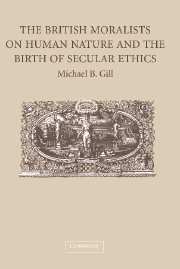Book contents
- Frontmatter
- Contents
- Introduction
- PART ONE WHICHCOTE AND CUDWORTH
- PART TWO SHAFTESBURY
- PART THREE HUTCHESON
- PART FOUR DAVID HUME
- 15 David Hume's New “Science of Man”
- 16 Hume's Arguments against Moral Rationalism
- 17 Hume's Associative Moral Sentiments
- 18 Hume's Progressive View of Human Nature
- 19 Comparison and Contingency in Hume's Account of Morality
- 20 What Is a Humean Account, and What Difference Does It Make?
- Notes
- Bibliography
- Index
19 - Comparison and Contingency in Hume's Account of Morality
Published online by Cambridge University Press: 29 July 2009
- Frontmatter
- Contents
- Introduction
- PART ONE WHICHCOTE AND CUDWORTH
- PART TWO SHAFTESBURY
- PART THREE HUTCHESON
- PART FOUR DAVID HUME
- 15 David Hume's New “Science of Man”
- 16 Hume's Arguments against Moral Rationalism
- 17 Hume's Associative Moral Sentiments
- 18 Hume's Progressive View of Human Nature
- 19 Comparison and Contingency in Hume's Account of Morality
- 20 What Is a Humean Account, and What Difference Does It Make?
- Notes
- Bibliography
- Index
Summary
Moral sentimentalists hold that our moral judgments are contingent on our sentiments. If we had different sentiments, according to moral sentimentalists, we would make different moral judgments, and if we had no sentiments, we would make no moral judgments at all.
Moral rationalists of the seventeenth and eighteenth centuries thought this sentimental contingency was unacceptable. According to the rationalists, when we make moral judgments, we attempt to represent truths that are independent of our sentiments. So if we come to believe that our moral judgments are contingent in the way sentimentalism implies, we will not be able to maintain confidence in them. Call this the “contingency objection” to moral sentimentalism.
Hutcheson and Hume were aware of this objection, and they gave the same official answer to it. But while that official answer reflects accurately Hutcheson's moral sense theory, it obscures at least as much of Hume's sentimentalism as it reveals.
In Section A, I briefly describe some examples of the contingency objection and Hutcheson and Hume's official answer to it. In C, I discuss the role comparison plays in Hume's account of several kinds of non-moral judgments. In D, I examine the role comparison plays in Hume's account of moral judgment. In D, I elaborate on the conflict between Hume's account and the official answer to the contingency objection. And in E, I show how Hume uses comparison to mount a final, decisive attack on the Human Nature Question.
- Type
- Chapter
- Information
- Publisher: Cambridge University PressPrint publication year: 2006



